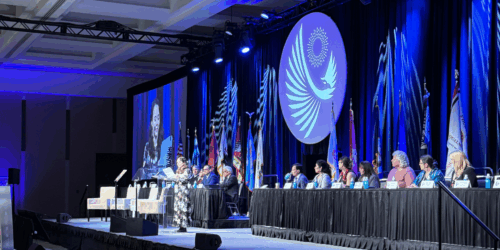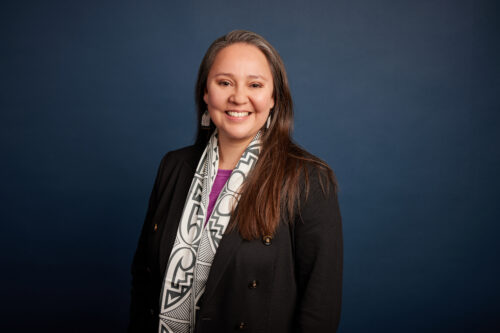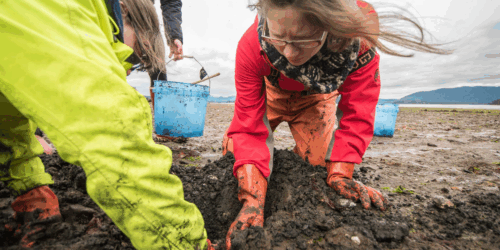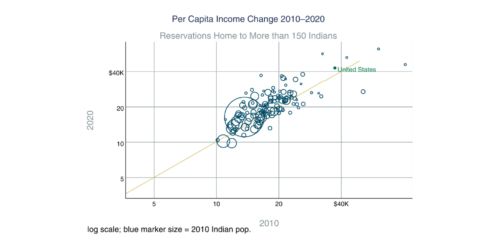CAMBRIDGE, MASS – The Harvard Project on Indigenous Governance and Development’s Honoring Nations program is pleased to announce the selection of 18 semifinalists for the prestigious 2025 Honoring Nations awards.
Founded in 1998, Honoring Nations identifies, celebrates and shares excellence in American Indian tribal governance. At its core, Honoring Nations is grounded in the belief that tribes themselves hold the keys to generating social, political, and economic prosperity and that self-governance is vital to building and sustaining strong, healthy Indian Nations. Awarded programs are beacons of inspiration representing the very best in self-determination. Their bright light leads the way in achieving what is possible. By sharing their best practices, all governments – tribal and non-tribal alike – can learn and benefit.
This year, Honoring Nations received over 100 applications from 76 tribal nations and seven tribal consortia, making it one of the most competitive years to date. Out of this pool, 18 exceptional programs were selected as semifinalists (see below). These programs have demonstrated tremendous impact in their communities and evidenced great effectiveness, significance to sovereignty, cultural relevance, transferability and sustainability – the criteria by which Honoring Nations assesses applicant programs. Each of these programs will be presented to the Honoring Nations’ Board of Governors in May, and the Board will select six applicant programs to receive site visits. In November, the Honoring Nations Board will select the awardees.
“Our destiny is in our hands. Being capable of directing our own futures and defending the futures of our children and the futures of our nations is profoundly important. Honoring Nations understands this – and is a very, very positive program in Indian Country,” said Chief Oren Lyons, Faithkeeper of the Onondaga Indian Nation and chairman emeritus of the Honoring Nations Board of Governors.
Semifinalist Programs:
Bears Ears Inter-Tribal Coalition – Hopi Tribe, Pueblo of Zuni, Navajo Nation, Ute Indian Tribe, and Ute Mountain Ute Tribe
Career Pathways – Gila River Indian Community
Citizen Potawatomi Nation Eagle Aviary – Citizen Potawatomi Nation
Community Wildfire Protection Plan (CWPP): Goats Fire Fuel Mitigation Program – San Manuel Band of Mission Indians
Five Tribes Wildlife Management – Cherokee Nation, Chickasaw Nation, Choctaw Nation of Oklahoma, Muscogee Nation, Seminole Nation
Fond du Lac Land Information Department – Fond du Lac Band of Lake Superior Chippewa
Grey Snow Eagle House – Iowa Tribe of Oklahoma
Inter-Tribal Indigenous Marine Stewardship Area (IMSA) Initiative – Tolowa Dee-ni’ Nation, Pulikla Tribe of Yurok People, Cher-Ae Heights Indian Community of the Trinidad Rancheria
Iron Horse Industrial Park – Citizen Potawatomi Nation
Jicarilla Apache Nation’s Water Sharing Agreement with the State of New Mexico and The Nature Conservancy – Jicarilla Apache Nation
Lower Sioux Community Industrial Hemp Housing Program – Lower Sioux Indian Community
MHA Emergency Operations Center – Mandan, Hidatsa and Arikara Nation
Mother Town Healing Program – Eastern Band of Cherokee Indians
Northwest Indian Treatment Center – Squaxin Island Tribe
OSU College of Osteopathic Medicine at the Cherokee Nation – Cherokee Nation
Sche’lang’en Village Transformational Wrap-Around Program – Lummi Nation
Snoqualmie Tribe’s Lands Protection Tax – Snoqualmie Indian Tribe
Taos Pueblo Priority Process – Taos Pueblo
**********************************************
For more information about Honoring Nations, please visit the Harvard Project’s website at www.IndigenousGov.hks.harvard.edu or contact Melissa Yazzie at Melissa_Yazzie@hks.harvard.edu.




